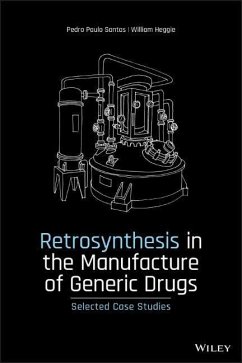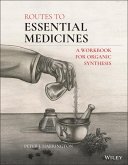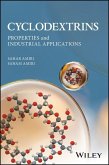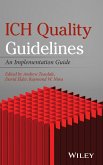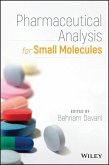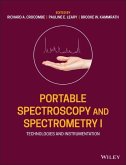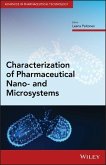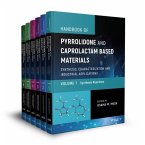Offers a compendium of information on retrosynthesis and process chemistry, featuring innovative "reaction maps" showing synthetic routes of some widely used drugs
This book illustrates how the retrosynthetic tool is applied in the Pharmaceutical Industry. It considers and evaluates the many viable synthetic routes that can be used by practicing industrialists, guiding readers through the various steps that lead to the "best" processes and the limits encountered if these are put into practice on an industrial scale of seven key Active Pharmaceutical Ingredient (API). It presents an evaluation of the potential each process has for implementation, before merging the two points of view--of retrosynthesis and process chemistry--in order to show how retrosynthetic analysis assists in selecting the most efficient route for an industrial synthesis of a particular compound whilst giving insight into the industrial process. The book also uses some key concepts used by process chemists to improve efficiency to indicate the best route to select.
Each chapter in Retrosynthesis in the Manufacture of Generic Drugs Selected Case Studies is dedicated to one drug, with each containing information on: worldwide sales and patent status of the Active Pharmaceutical Ingredient (API); structure analysis and general retrosynthetic strategy of the API; first reported synthesis; critical analysis of the processes which have been developed and comparison of the synthetic routes; lessons learned; reaction conditions for Schemes A to X; chemical "highlights" on key reactions used during the synthesis; and references. Drugs covered include: Gabapentin, Clopidogrel, Citalopram and Escitalopram, Sitagliptin, Ezetimibe, Montelukast, and Oseltamivir.
_ Show how the retrosynthetic tool is used by the Pharmaceutical Industry
_ Fills a gap for a book where retrosynthetic analysis is systematically applied to active pharmaceutical ingredients (APIs)
_ Features analyses and methodologies that aid readers in uncovering practical synthetic routes to other drug substances, whether they be NCEs (New Chemical Entities) or generic APIs (Active Pharmaceutical Ingredients)
_ Presents information from both the patent and academic literature for those who wish to use as a basis for further study and thought
_ Features the use of "reaction maps" which display several synthetic processes in the same scheme, and which allow easy comparisons of different routes that give the same molecule or intermediate.
A selection of these maps are available to download from: https://www.wiley.com/go/santos/retrosynthesis
Retrosynthesis in the Manufacture of Generic Drugs Selected Case Studies is an ideal book for researchers and advanced students in organic synthetic chemistry and process chemistry. It will also be of great benefit to practitioners in the pharmaceutical industry, particularly new starters, and those new to process chemistry.
Hinweis: Dieser Artikel kann nur an eine deutsche Lieferadresse ausgeliefert werden.
This book illustrates how the retrosynthetic tool is applied in the Pharmaceutical Industry. It considers and evaluates the many viable synthetic routes that can be used by practicing industrialists, guiding readers through the various steps that lead to the "best" processes and the limits encountered if these are put into practice on an industrial scale of seven key Active Pharmaceutical Ingredient (API). It presents an evaluation of the potential each process has for implementation, before merging the two points of view--of retrosynthesis and process chemistry--in order to show how retrosynthetic analysis assists in selecting the most efficient route for an industrial synthesis of a particular compound whilst giving insight into the industrial process. The book also uses some key concepts used by process chemists to improve efficiency to indicate the best route to select.
Each chapter in Retrosynthesis in the Manufacture of Generic Drugs Selected Case Studies is dedicated to one drug, with each containing information on: worldwide sales and patent status of the Active Pharmaceutical Ingredient (API); structure analysis and general retrosynthetic strategy of the API; first reported synthesis; critical analysis of the processes which have been developed and comparison of the synthetic routes; lessons learned; reaction conditions for Schemes A to X; chemical "highlights" on key reactions used during the synthesis; and references. Drugs covered include: Gabapentin, Clopidogrel, Citalopram and Escitalopram, Sitagliptin, Ezetimibe, Montelukast, and Oseltamivir.
_ Show how the retrosynthetic tool is used by the Pharmaceutical Industry
_ Fills a gap for a book where retrosynthetic analysis is systematically applied to active pharmaceutical ingredients (APIs)
_ Features analyses and methodologies that aid readers in uncovering practical synthetic routes to other drug substances, whether they be NCEs (New Chemical Entities) or generic APIs (Active Pharmaceutical Ingredients)
_ Presents information from both the patent and academic literature for those who wish to use as a basis for further study and thought
_ Features the use of "reaction maps" which display several synthetic processes in the same scheme, and which allow easy comparisons of different routes that give the same molecule or intermediate.
A selection of these maps are available to download from: https://www.wiley.com/go/santos/retrosynthesis
Retrosynthesis in the Manufacture of Generic Drugs Selected Case Studies is an ideal book for researchers and advanced students in organic synthetic chemistry and process chemistry. It will also be of great benefit to practitioners in the pharmaceutical industry, particularly new starters, and those new to process chemistry.
Hinweis: Dieser Artikel kann nur an eine deutsche Lieferadresse ausgeliefert werden.
